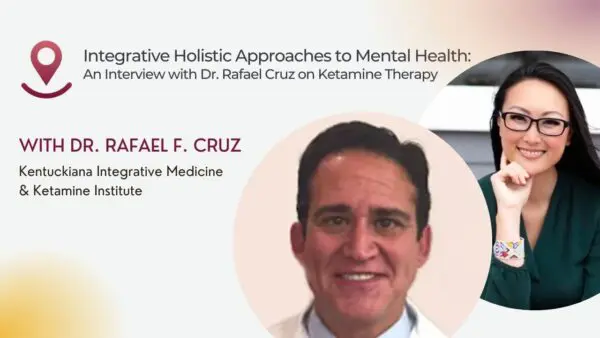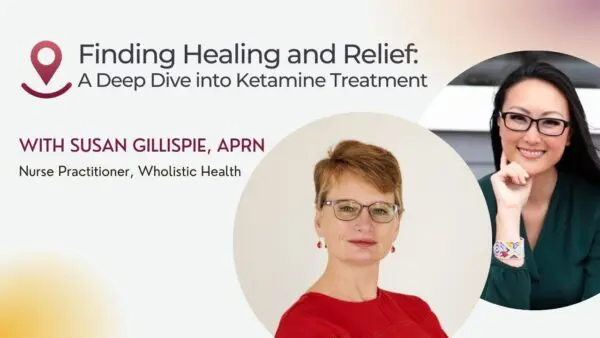Over the past few years, ketamine therapy has surged as a novel treatment for mental health conditions, in particular, treatment-resistant depression. As the psychedelic medicine also treats suicidal ideation, its growing acceptance in the medical community is literally life-saving. However, while generally safe, ketamine is still a medicine that requires top-notch medical administration and supervision. While many well-intentioned psychiatrists, therapists, and anesthesiologists offer services to the world through reputable ketamine treatment centers, not everyone can be trusted. Some “treatment centers” are looking to cash in on ketamine’s popularity while avoiding safety guidelines and clinical standards of care. Learn what ketamine is, how it works, and how to find a treatment center that you can trust.
What Is Ketamine?
Ketamine bears the honor of being the first and only FDA-approved psychedelic medicine. The nasal spray Spravato (esketamine) was approved in March of 2019 for treatment-resistant depression, and a growing number of patients are going to ketamine treatment centers for infusions, an off-label use of generic ketamine.
Ketamine is a mixture of two mirror-image molecules, “R” and “S” ketamine. Spravato only contains the “S” molecule (esketamine). This is because ketamine (racemic ketamine) is a generic medicine and cannot be patented or profited on. It’s been used for anesthesia and pain-relieving purposes since it made a name for itself on the Vietnam War battlefields. By isolating the “S” molecule, Janssen Pharmaceuticals, a subsidiary of Johnson & Johnson, the company behind Spravato, branded and monetized their nasal spray. Spravato can cost from $590 to $885 per treatment session.
However, some studies suggest that ketamine infusions, rather than an esketamine nasal spray, are the most successful in treating depression. A ketamine infusion is not something most people can do safely in their own homes. As a result, the off-label use of ketamine infusions for depression, suicidal thoughts, post-traumatic stress disorder (PTSD), and more is available in ketamine clinics and treatment centers all over the country. Ketamine infusion centers also provide treatment for chronic pain. While this means that more people have access to effective psychedelic medicine, Janssen Pharmaceuticals is far from the only one trying to make a buck. Ketamine infusions, which are done off-label, can cost between $400 to $2,000 per treatment.
Does Ketamine Work?
Ketamine is not bogus, nor is it snake oil. There is solid science backing up its use for depression, in addition to suicidal thoughts and PTSD. It is also being researched for chronic pain and migraine relief. Ketamine works, but only if one has a condition it treats. However, because off-label use is so unregulated, people can basically advertise ketamine however they want. An investigation by STAT shows that ketamine clinics across the country are making sweeping claims, skipping adequate screening processes, and varying widely on the frequency and dose of treatment. This isn’t just greedy — it’s dangerous. Ketamine is generally considered safe and is even on the World Health Organization’s list of essential medicines. However, it does come with risks. Therefore, one should only receive ketamine infusions at a reputable ketamine treatment center, which, unfortunately, are becoming harder to find.
Here are some tips and considerations for finding a reputable ketamine treatment center:
Ask a psychiatrist If someone is experiencing treatment-resistant depression or suicidal thoughts, they should have a psychiatrist well-versed in your clinical, medical, and psychiatric history. Since one’s psychiatrist will be most familiar with their condition, and likely has ties to appropriate referral sources, they should be the first person to ask when considering ketamine treatment.
Make sure the ketamine clinic has a mental health staff on hand Treating depression, PTSD, or suicidal thoughts should not be taken lightly. While it’s true that the healing starts to take place after a session, receiving a ketamine infusion can be an intense experience just like any other psychedelic experience. This is especially true if one is battling thoughts of self-harm or suicide. It’s simply irresponsible to put depressed, traumatized, and suicidal patients in a vulnerable state and not have a certified mental health staff on hand.
What else does the ketamine treatment center do? Usually, ketamine clinics focus on ketamine. While this may change as legalities around other psychedelics expand, you want to see people who are experts in ketamine. Beware of treatment centers that offer everything from botox, to vitamin infusions, to ketamine therapy.
Some ketamine treatment centers offer ketamine-assisted psychotherapy. The individual undergoes psychotherapy with a trained therapist while under the effect of the medicine. The pharmacological changes augment the psychotherapy process and help the patient open up to new perspectives. Because of how rapidly the ketamine down-regulates the brain’s default mode network, clients can gain new perspectives on thoughts surrounding depressive episodes.
What is the screening process like? Since ketamine infusions are so costly and profitable, many treatment centers may take in whoever can pay. Reputable ketamine clinics require a referral from a psychiatrist who will collaborate in treatment and patient care. There should be an initial clinical intake session, during which one sits with the doctor on staff and discusses their medical history and treatment goals to determine the appropriateness of the treatment. Ketamine can potentially raise one’s blood pressure and heart rate, so a basic physical should be done in addition to a mental health review.
Make sure there’s an anesthesiologist present Competent ketamine clinics have both an anesthesiologist and mental health staff. Ketamine infusions for mental health are given at sub-anesthetic doses and a qualified professional should be present in the chance that changes in breathing or blood pressure do occur.
Is there integration work and aftercare? A ketamine clinic should evaluate a patient’s mental health continuously. Ideally, a trained professional should check in with the patient after the infusion. Usually one starts with a course of six infusions over two weeks and a check-in after the third session. Then, the patient comes in for boosters, usually about once a month. Ongoing mental health care and integration work should coincide with treatment.
Patients also may wish to integrate insights obtained during a ketamine infusion with a psychotherapist in between sessions. Psychotherapy integration can help patients make sense of insights and create new cognitive and behavioral changes to lead to symptom reduction and remission.
The treatment center should be honest about ketamine’s risks and limitations While ketamine is a life-saver for some, it doesn’t work for every patient (especially if a treatment center is advertising unresearched uses). There is also a lack of research on the long-term use of ketamine infusions. This shouldn’t be a secret, it should be presented upfront so a patient knows what they’re signing up for.
Final Thoughts and Conclusion
Ketamine is a landmark discovery for mental health care, in particular, treatment-resistant depression. While Spravato nasal spray is the only FDA-approved use of ketamine for mental health, research shows that ketamine infusions may be most effective. There are doctors and therapists across the country providing this off-label use at ketamine treatment centers, often with great safety and success. However, as with any industry, there are untrustworthy players with little regard to patient care. As a result, one must consult with their psychiatrist, go through a detailed intake process, and receive ongoing integration work at a reputable clinic to achieve results. The shortcomings and dangers of ketamine infusions should always be responsibly translated to the patient. The best-case scenario to avoid sketchy clinics is the creation of careful ketamine guidelines that strive for safety and do not fall into anti-drug propaganda.







